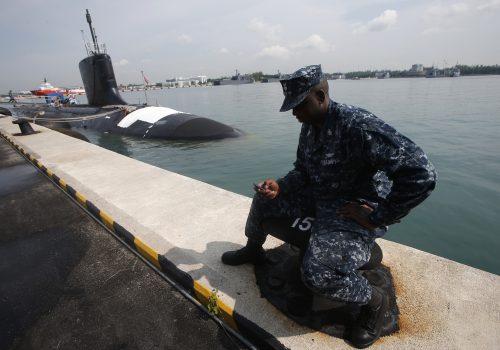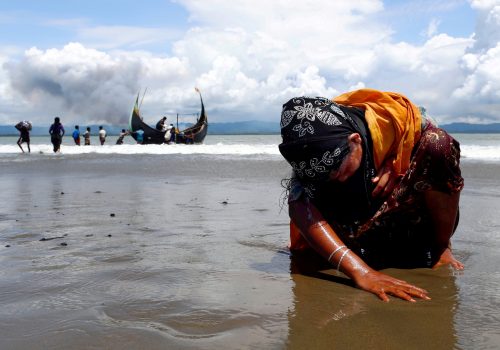Xi’s big bet helps explain the Australian submarine deal
Chinese President Xi Jinping is making the most audacious geopolitical bet of the twenty-first century.
A head-spinning series of seemingly disparate moves over recent months add up to nothing less than a generational wager that Xi can produce the world’s dominant power for the foreseeable future by doubling down on his state-controlled economy, party-disciplined society, nationalistic propaganda, and far-reaching global influence campaigns.
With each week, Xi raises the stakes further—from narrowing seemingly mundane personal freedoms, like karaoke bars or a teenager’s permitted time for online gaming, to the multibillion-dollar investor hit from his increased controls on China’s biggest technology companies and their foreign listings.
It is only in the context of Xi’s increased repressions at home and expanded ambitions abroad that one can fully understand Australian Prime Minister Scott Morrison’s decision this week to enter a new defense pact, which he called “a forever agreement,” with the United States and the United Kingdom.
Much of the news focus was either on the eight nuclear-powered submarines that Australia would deploy or the spiraling French outrage that their own deal to sell diesel submarines to Australia was undermined by what French officials called a “betrayal” and a “stab in the back” from close allies. France went so far as to recall its ambassador to the United States for the first time in the history of the alliance between the two countries.
All that noise should not distract from the more significant message of the groundbreaking agreement. Morrison saw more strategic advantage and military capability from the US-UK alignment in a rapidly shifting Indo-Pacific atmosphere, replacing his previous stance of trying to balance US and Chinese interests.
“The relatively benign environment we’ve enjoyed for many decades in our region is behind us,” Morrison said on Thursday. “We have entered a new era with challenges for Australia and our partners.”
For China, that new era has many faces: a rapid rollback of economic liberalization, a crackdown on individual freedoms, an escalation of global influence efforts, and a military buildup, all in advance of the twentieth national party congress in October 2022, where Xi hopes to seal his place in history and his continued rule.
Former Australian Prime Minister Kevin Rudd, one of the world’s leading China experts and the president of the Asia Society, points in a recent speech to Xi’s “bewildering array” of economic-policy decisions.
Those decisions started last October with the shocking suspension of Alibaba financial affiliate Ant Group’s planned initial public offering in Hong Kong and Shanghai, clearly aimed at Alibaba co-founder Jack Ma. Then in April, Chinese regulators imposed a three-billion-dollar fine on Alibaba for “monopolistic behavior.”
In July, China’s cyber regulator removed ride-hailing giant Didi from app stores, while an investigative unit launched an examination of the company’s compliance with Chinese data-security laws.
Then this month, China’s Transport Ministry regulators summoned senior executives from Didi, Meituan, and nine other ride-hailing companies, ordering them to “rectify” their digital misconduct. The Chinese state then took an equity stake in ByteDance, the owner of TikTok, and in Weibo, the micro-blogging platform.
Xi was ready to accept the estimated $1.1 trillion cost in shareholder value wiped from China’s top six technology stocks alone between February and August. That doesn’t factor in further losses among the education, transportation, food-delivery, entertainment, and video-gaming industries.
Less noticed have been a dizzying array of regulatory actions and policy moves whose sum purpose appears to be strengthening state control over, well, just about everything.
“The best way to summarize it,” says Rudd, “is that Xi Jinping has decided that, in the overall balance between the roles of the state and the market in China, it is in the interests of the party to pivot toward the state.” Xi is determined to transform modern China into a global great power, “but a great power in which the Chinese Communist Party nonetheless retains complete control.”
That means growing controls as well over the freedoms of its 1.4 billion citizens.
Xi has acted, for example, to restrict the video gaming of school-aged children to three hours a week, and he has banned private tutoring. Chinese regulators have ordered broadcasters to encourage masculinity and remove “sissy men,” or niang pao, from the airwaves. Regulators banned American Idol-style competitions and removed from the internet any mention of one of China’s wealthiest actresses, Zhao Wei.
“The orders have been sudden, dramatic and often baffling,” writes Lily Kuo in the Washington Post. Jude Blanchette of the Center for Strategic and International Studies says, “This is not a sector-by-sector rectification; this is an entire economic, industry and structural rectification.”
At the same time, President Xi has launched a push to share the virtues and successes of the Chinese authoritarian model with the rest of the world.
“Beijing seeks less to impose a Marxist-Leninist ideology on foreign societies than to legitimate and promote its own authoritarian system,” Charles Edel and David Shullman, the recently appointed director of the Atlantic Council’s new China Global Hub, write in Foreign Affairs. “The CCP doesn’t seek ideological conformity but rather power, security, and global influence for China and for itself.”
The authors detail China’s global efforts to not remake the world in its image, but rather “to make the world friendlier to its interests—and more welcoming to the rise of authoritarianism in general.”
Those measures include “spreading propaganda, expanding information operations, consolidating economic influence, and meddling in foreign political systems” with the ultimate goal of “hollowing out democratic institutions and norms within and between countries,” Edel and Shullman write.
Within President Xi’s bold bet lie two opportunities for the United States and its allies.
The first is that Xi, by overreaching in his controls at home, will undo just the sorts of economic and societal liberalization China needs to succeed. At the same time, the world’s democracies, like Australia, are growing more willing to seek a common cause to address Beijing.
In the end, however, Xi’s concerted moves require an equally concerted response from the world’s democracies. The French-US crisis following the Australian defense deal this week provides just one example of how difficult that will be to achieve and sustain.
This article originally appeared on CNBC.com
Frederick Kempe is president and chief executive officer of the Atlantic Council. You can follow him on Twitter @FredKempe.
THE WEEK’S TOP READS
#1 How China Exports Authoritarianism
Charles Edel and David O. Shullman | FOREIGN AFFAIRS
In this smart, must-read analysis of China’s motives and means of influence, David Shullman and Charles Edel argue that China seeks to reshape the world order to better protect its interests and uses corrupt elites in fragile democracies and budding authoritarian countries as a means to this end.
“To respond to Beijing’s ideological challenge,” they write, “advocates of democracy must have a better understanding of what China aims to achieve by exporting its political model and how its actions are weakening democracy globally. Only then can they effectively design policies that will reinvigorate democracy at home and abroad while selectively seeking to counter Beijing’s promotion of authoritarian governance.” With Xi ever more determined to assert himself at home and abroad, and authoritarianism still on the rise, understanding and countering China’s aims has never been more urgent. Read more →
#2 A new U.S. alliance responding to the Chinese threat ignites age-old tensions with France
David Ignatius | THE WASHINGTON POST
David Ignatius, one of the best observers of international relations writing today, provides a characteristically smart analysis of the US-UK-Australia defense deal. Though the French are outraged, Ignatius writes, “the strategic impact of the deal — and its promise to accelerate an American-led response to China’s rapidly expanding military power — should outweigh the short-term anger from Paris and other European capitals.”
Perhaps most importantly, Ignatius notes, “Australia’s heart has been with the United States, but its wallet depended on China. Beijing sought to exploit this economic vulnerability and pressure Australia into distancing itself from the West. With the AUKUS pact, Washington pushed back hard, and showed it has Australia’s back.” Read more →
#3 Xi Jinping’s crackdown on everything is remaking Chinese society
Lily Kuo | THE WASHINGTON POST
For a broader understanding of the scope of China’s latest authoritarian crackdown, read Lily Kuo’s chilling reporting on China’s sudden, alarming, and increasingly frequent attacks on companies and individuals in China who have somehow displeased the Chinese Communist Party.
“The party does not feel comfortable with expressions of individualism that are in some ways transgressive to norms that it puts forward,” Kuo quotes Rana Mitter, a professor of modern Chinese history and politics at the University of Oxford, as saying. “The party-state makes it clear that it has the first and last word on what is permitted in mass culture.”
And indeed, the Chinese “expect more measures to come, targeting regular life as well as other sectors. While the Ministry of Culture and Tourism is preparing a ban on karaoke songs deemed out of line with ‘the core values of socialism,’ city officials are regulating dancing in China’s parks, a popular pastime for retirees.” As Xi prepares to “upset a decades-old system of term limits and leadership succession” next fall, this is an alarming vision of the extent of the control he wishes to assert. Read more →
#4 As Russians Vote, Resignation, Anger and Fear of a Post-Putin Unknown
Anton Troianovski \ THE NEW YORK TIMES
Also notable this week are the Russian elections, which end on Sunday. To understand the mindset of people going into that election, which has already seen an even more ruthless crackdown than usual from Vladimir Putin’s government, read this grim and powerful piece of reporting from the New York Times, covering the reactions of people along a three-thousand-mile journey from Murmansk to Chechnya.
Perhaps nowhere does the tragicomic absurdity of the whole situation come through more clearly than in Chechnya, where Troianovski interviews the regional secretary of the token opposition party about how she’s voting.
“I will vote for Kadyrov, of course,” she says, referring to Putin’s Chechen strongman. “One must be honest and know what is best for the people.” Read more →
#5 How a Syrian War Criminal and Double Agent Disappeared in Europe
Ben Taub \ THE NEW YORKER
In a masterly piece of investigative reporting, Ben Taub follows the trail of a mysterious Syrian intelligence official—a possible defector or regime double agent—through a winding maze of intelligence agencies, competing loyalties, and bizarre instances of incompetence.
“In the past two years,” Taub writes of his reporting, “I have discussed Halabi’s case with spies, politicians, activists, defectors, victims, lawyers, and criminal investigators in six countries, and have reviewed thousands of pages of classified and confidential documents in Arabic, French, English, and German. The process has been beset with false leads, misinformation, recycled rumors, and unanswerable questions—a central one of which is the exact timing and nature of Halabi’s recruitment by Israeli intelligence. Nobody had a clear explanation, or could say what he contributed to Israeli interests. But, slowly, a picture began to emerge.” Read more →
Atlantic Council top reads
Image: China's President Xi Jinping is shown on a screen through digitally decorated glass during the World Internet Conference in Wuzhen, Zhejiang province, China, on November 23, 2020. Photo by Aly Song/Reuters.


